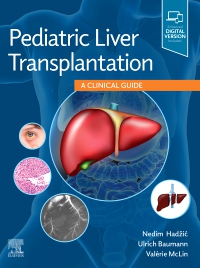
Pediatric Liver Transplantation, 1st Edition
Hardcover

-
- Provides an in-depth understanding of all aspects of pediatric liver transplantation, ideal for pediatric hepatologists, pediatric transplant surgeons, and others on the pediatric transplant team.
- Covers all surgical techniques in detail, including split graft, living related, auxiliary, and domino.
- Discusses pediatric liver transplantation consideration for an increasing number of additional metabolic, hematologic and renal conditions; breakthroughs in grafting and stem cell therapy; and techniques and present role of hepatocyte transplantation.
- Uses a quick-reference templated format; each chapter includes an overview, pathophysiology, conventional management, controversies, and bulleted summary of key take-aways.
- Includes state-of-the-art mini-reviews based on updated references and author experience throughout the text.
- Features a full-color design with numerous algorithms, figures, and radiological and histopathological photos.
- Enhanced eBook version included with purchase. Your enhanced eBook allows you to access all of the text, figures, and references from the book on a variety of devices.
-
- Evolution of transplantation medicine
- Before transplantation
- Paediatric liver transplantation
- Management after Transplantation
BRIEF HISTORY OF PLT
HEALTH SYSTEM BACKGROUND REQUIREMENTS FOR PLT
Brain death criteria
Non-heart beating donors
Donor procurement
Managing a scarce resource: Differences in donor allocation across the world
INDICATIONS AND CONTRAINDICATIONS (and their evolution) – General aspects
(List of diagnoses)
PREPARATION FOR PLT
Medical (immunisations/cardiac/renal/neurological aspects)
Surgical and Radiological aspects
Psychological/Social aspects
ANAESTHETIC ASPECTS (Risk assessment)
SURGICAL ASPECTS (Choice of donor for PLT, Prevention of thrombosis/anticoagulation)
SURGICAL TECHNIQUES
Split graft
Living-related
Auxiliary
Domino
Techniques and present role of hepatocyte transplantation
STRATEGIES IN IMMUNE SUPPRESSION (Immune ablation, renal-sparing, steroid-sparing)
INTENSIVE CARE ASPECTS
ANTI-INFECTION STRATEGIES
Viral
Bacterial
Fungal
EARLY COMPLICATIONS
SURGICAL (biliary, vascular, etc.)
MEDICAL
ROLE OF HISTOLOGY AFTER PLT
ROLE OF RADIOLOGY AND INTERVENTIONAL RADIOLOGY AFTER PLT
LATE COMPLICATIONS
SURGICAL (graft re-modelling, secondary portal hypertension/shunts)
MEDICAL (recurrent disease post-PLT, de novo AIH, post-transplant lymphoproliferative disease, nephrotoxicity)
PSYCHOSOCIAL ASPECTS AFTER PLT
(social reintegration, medication adherence, family planning, education)
PROSPECTS FOR IMMUNE TOLERANCE (possibilities for safe withdrawal of immunosuppression)
TRANSITION TO ADULT SERVICES (smooth handover of care to a different system)
FUTURE REQUIREMENTS

 as described in our
as described in our 